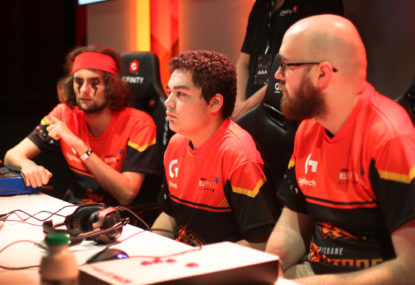2022 Trivia: The Roar's jam-packed Christmas Day sports quiz!
The jam-packed month-by-month quiz full of 2022 sports trivia!

Everyone has their own opinion as to whether people playing video games competitively constitutes a sport. But for a growing number of Australians, these electronic experiences are quickly becoming the biggest events on their personal sporting calendars.
For me, I live in both worlds. I’ve attended AFL matches for more than 15 years and follow the NHL (ice hockey), NFL and Major League Baseball extensively too. I’ve also, however, played video games my entire life and, over the last few years, become infatuated with the competitive scenes of some of my favourite titles.
Earlier this year, Australia’s first ever city-based esports competition – the Gfinity Elite Series – launched. Having covered the competition extensively, alongside other events like the Overwatch World Cup, Overwatch League and Hearthstone World Championship, I’ve picked up some pretty key differences between the audiences of esports and ‘real’ sports.
I’m not here to turn e-cynics into believers (there’s enough of us esports fans out there for it not to matter if you don’t regard it as sport) but, as someone who can genuinely say they are a fan of both, it’s clear these worlds have plenty to learn off one another.
One thing esports fans do a lot more than traditional sporting fans is actually play the game they’re following regularly. I for one have never played a full game of Australian rules football before (although I did umpire for several years), whereas you can find me on Overwatch or Hearthstone almost nightly.
We all have our own – perfectly legitimate – reasons for not being able to necessarily get out and play the sports we follow, but the fact is that this more frequent interaction with the game itself makes esports fans far more appreciative of just generally good play when they watch – regardless of which team pulled it off.
At the Elite Series CS:GO grand final, Melbourne Order and Sydney Chiefs fans were gasping and applauding in unison at the incredible shots and passages of brilliance on display. Of course, the Melbourne fans had more to cheer about – and cheer loudly they did when things fell their way – but everyone was primarily there to see the game played at such a high level.
I’ll be the first to admit, when I’m at the SCG, I have no interest in any goal of the year contenders from the visiting team. Sure, I and many others will appreciate the major once it’s removed from a potentially defeat-inducing context but, at the time, it’s just six points the Swans need to claw back.
When teams go on dynasties – fans everywhere call for them to be brought down. When superstars are breaking the game open – opposing fans groan and implore their team to put a stop to the highlight reel unfolding before them.
Sometimes, as sports fans, we forget that what we’re seeing is an activity we love being played at very highest level. Of course it’s always going to burn when our team doesn’t come out on top – but why can’t we enjoy the brilliance on display at the same time?
Just a few weeks ago at the Hoyts Gfinity Esports Arena, the Sydney crowd couldn’t help but get behind the underdog Melbourne Avant as they caused the upset of the Rocket League season against the Chiefs.
Over the last fortnight at Los Angeles’ Blizzard Arena, both of the local teams in the Valiant and Gladiators got trounced in their semi-finals – but the hometown fans were still enamoured with the skill and strategy of their opponents all the way.
That love and appreciation for the skill of the competitors is something traditional sports fans occasionally misplace.
Esports fans can definitely learn a thing or two from their equivalents in the grandstands as well. Getting behind players and actively supporting them for their skill – not just their twitch personality – will help more and more talented individuals make the leap, and they also need to embrace structured league competitions rather than just irregular tournaments if this is ever going to crack the mainstream.
But, for the most part, esports fans really aren’t too different to the people you meet at the ‘real’ stadiums. They love the atmosphere, they get loud and they want nothing more than their side getting over the line.
They’re just that little bit better at lowering the team-coloured lenses every now and then.